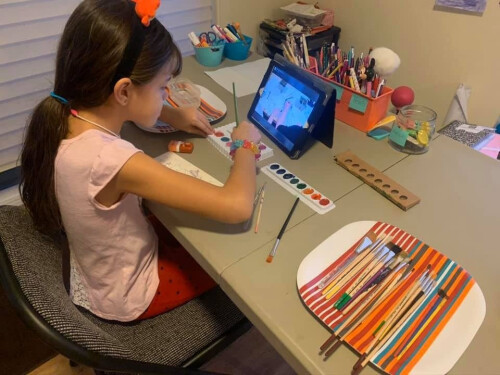8 Tips For Parents To Support Children While Learning Remotely

This article was originally posted here.
Many of us feel overwhelmed with all the stresses of life during a pandemic. However, there are still actions we can take to maintain a semblance of normality for our kids and reduce the impact on their virtual education.
Here are eight ways you can support distance learning and keep your children on track for educational success:
1. CREATE A DEDICATED SPACE FOR LEARNING.
Many adults who work from home have a dedicated home office space, even if it’s just a table in a corner. Now that your child is learning at home, they may benefit from a similar setup.
Most children will do their best work in a space that is at least moderately quiet, comfortable, and separate from where they play. Help your child choose and set up a place for schoolwork, preferably one that is away from the TV and similar distractions.
2. STICK TO A DAILY FAMILY ROUTINE (TO THE EXTENT THAT YOU CAN).
Routines provide a much-needed sense of normality in your child’s life. Even if your work schedule changes from day to day, you can focus on providing healthy meals for your child and encourage regular sleeping habits.
It’s also important to make time for breaks from learning. If your child were still attending school in person, they would have regular recesses, lunch breaks, and snack times or naps. Encourage your child to play in the backyard or maybe even bike around the block.
3. READ TO YOUR CHILD REGULARLY.
Reading to your child is one of the best things you can do. When you read books aloud, you stimulate your child’s imagination even as you help them develop language and listening skills.
Researchers and educators believe that reading aloud to children supports cognitive development, improves language skills, increases concentration and creativity, and prepares them for academic success. Best of all, taking the time to read together can help you grow a stronger relationship with your child.
It’s also a good idea to read yourself if you have time. If your child sees you reading for fun, they will be more likely to follow your example. Getting your child hooked on books early on will cultivate a lifelong love of reading.
4. SET UP VIDEO CHATS WITH YOUR CHILD’S FRIENDS.
It may not be safe to let your children have playdates with their friends, but that doesn’t mean you have to completely cut off contact. There are still plenty of ways your child can interact with their peers virtually. Video chats and phone calls are safe ways to encourage meaningful interactions between your kid and their peers.
If your child does not already call or video chat with their friends, reach out to other parents to ask about setting up a video playdate. While it’s not a true substitute for face-to-face interaction, video chatting can help your child feel a bit less isolated.
5. MONITOR THE QUALITY OF NON-LEARNING SCREEN TIME.
Your previous goal to limit your children’s screen time to an hour per day may seem laughable during lockdown, especially if your child is engaged in remote learning. However, time isn’t the only — or even best — way to measure your child’s screen health. What your child does on their screen is more important than how long they’re watching.
Encourage your child to engage in online activities that require them to think, be creative, and interact with their peers. Having your children FaceTime their grandparents, play STEM-inspired games, or watch age-appropriate educational content is far better than letting them play a violent video game, for example.
6. MAKE SURE YOUR CHILD UNDERSTANDS THAT THEY ARE NOT ON VACATION.
For some children, spending all day at home away from school might feel like an early summer vacation. However, educational responsibilities have not gone away. Most class assignments, grades, exams, and other obligations are still responsibilities.
Encourage your child to stick to a learning schedule despite any disruptions to normal life. Make sure they understand that virtual classroom meetings are just as important as their usual classroom lessons.
7. BE ENGAGED WITH YOUR CHILD’S EDUCATION.
Stay in the loop with your child’s progress. During a time of distance learning, it’s more important than ever to understand the expectations for your child’s learning. You don’t have to be involved in everything your child does, but you can help them stay engaged by going over their homework with them or simply asking them what they’re learning in school.
If you can, it’s a good idea to reinforce school concepts by giving your children home activities that relate to their new skills. For example, you could have your child use math to convert between measurements in the recipes you are cooking or ask them to read the recipe to you as you cook.
The more your child is exposed to learning concepts, the more likely they will be successful in school.
8. PROVIDE HEALTHY MEALS FOR YOUR CHILD.
Nutrition is key to every aspect of your child’s development, including their intellectual growth. Your children need plenty of nutrients to stay healthy and strong.
The CDC’s current dietary guidelines recommend that people aged 2 years or older include the following components in their diet:
- A variety of fruits and vegetables.
- Whole grains.
- Fat-free and low-fat dairy products.
- A variety of protein foods.
- Oils.
Make sure that your child eats breakfast every day and consumes plenty of produce. Studies show a healthy diet is correlated with better performance in school.
While we are going through an immensely stressful time, we also have an opportunity to deepen our connections with our children and learn more about their interests. We hope that all families will be able to come closer together during the pandemic.
